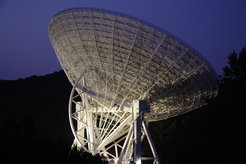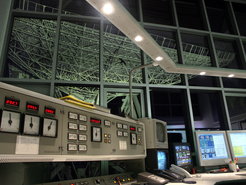Excellence of European Radio Astronomy Acknowledged
EU awards 10 Million Euro for RadioNet-FP7

RadioNet under the Sixth European framework FP6, has already started to transform radio astronomy in Europe. It is now natural for European radio astronomers to think in terms of collaboration as the way to proceed.
The general objective of RadioNet, as an Integrating Activity, is to optimise the use and development of European radio astronomy telescopes with an eye towards future large radio projects, including the next generation of large radio telescopes, the Atacama Large Millimetre Array (ALMA) and the Square Kilometre Array (SKA). A primary goal will be to ensure that European researchers have access to the radio astronomical facilities they need, in order to undertake the key science topics they wish to pursue. Another major goal is to ensure that innovative technical developments in Radio Astronomy are supported on a European-wide basis, pooling the broad range of skills, resources and expertise that exists in Europe. This will provide a critical mass that will ensure that progress is not made slowly in isolation but quickly and efficiently, via a broad-based, yet well-focused, scientific and engineering collaboration.
RadioNet-FP7 has grown, now involving 26 partners from 13 different countries, contributing effort to 18 independent work packages. They include partners from Germany: the Max Planck Institute for Radio Astronomy (MPIfR), the I. Physikalische Institut of Cologne University (KOSMA) and the Fraunhofer Institute for Applied Solid State Physics (IAF). The work packages include joint research activities, training for undergraduates and post-graduates, workshops targeted towards new and emerging topics of research and last but not least, enabling scientists to obtain easy access to Europe's largest and most sensitive radio telescopes.
The Max Planck Institute for Radio Astronomy (MPIfR) is participating as partner in a range of RadioNet-FP7 activities, with a number of networking activities (NA), providing the lead in two of them: 1) Engineering Forum, enhancing the communication, training and scientific interaction amongst engineers all over the world (Reinhard Keller); 2) Spectrum Management, providing a European voice within the regulatory bodies to protect the radio astronomy bands (Axel Jessner).
Moreover, the MPIfR grants observing time with the Effelsberg radio telescope within the transnational access (TNA) scheme. With its diameter of 100 meters it is the largest and most sensitive radio telescope in Europe. More than 1000 hours of observing time in single-dish mode and an additional 336 hours of VLBI (Very Long Baseline Interferometry) time with the Effelsberg telescope will be available in the TNA framework from 2009 to 2011, providing telescope observing opportunities, based on scientific quality criteria, to scientists from institutions in EU and partner countries.
MPIfR is partner in several joint research activities (JRA), such as APRICOT ("All Purpose Radio Imaging Cameras on Telescopes"), ALBiUS ("Advanced Long Baseline interoperable User Software") and AMSTAR+ ("Focal plane Arrays at Millimetre/Sub-millimetre wavelengths and THz frequencies for Astronomical Research"). APRICOT will develop the design and sub-system technology for broad-band focal-plane horn arrays appropriate for observations in the scientifically-rich range 30-50 GHz. "A major challenge will be packaging and system integration of the various components and in particular the cryogenic front-end has to be designed carefully to keep the receiver mechanically and cryogenically stable and easily maintainable", says Reinhard Keller. "Our engineering group at MPIfR will investigate appropriate receiver architectures with the goal to deliver a design paper ready to realize a multi pixel camera receiver".
In addition to member states, other countries participating are South Korea, United States of America and South Africa. The RadioNet-FP7 management plan builds on the close collaboration that many of the institutes have developed over the last 30 years of joint participation in the European VLBI Network (EVN) - an array of 16 major radio telescopes spanning Europe and other major regions of the world, in particular China and South Africa. "RADIONET provides a framework for scientific and technical cooperation in radio astronomy", says Anton Zensus. "It augments our institute's programs and provides many new opportunities for excellent research and development in our field."


